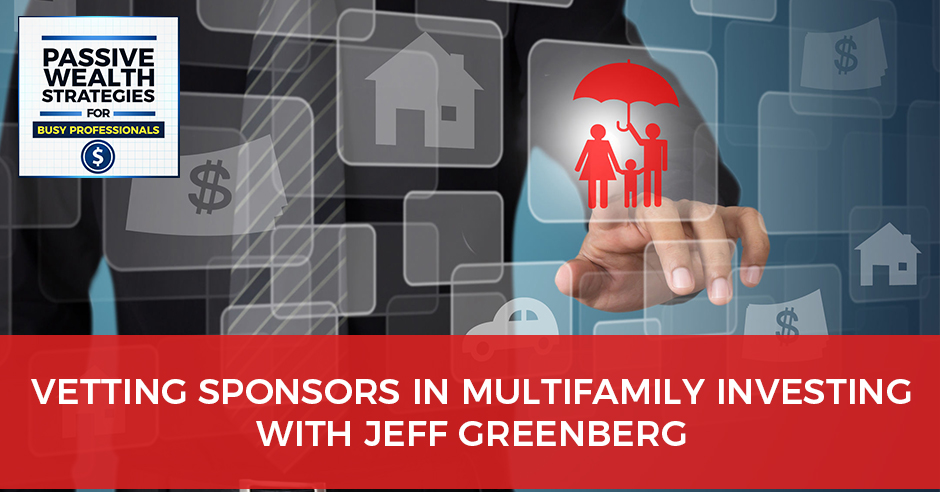The key to syndication is finding a reputable real estate investor, so how do you find them? Jeff Greenberg, the CEO of Synergetic Investment Group, walks us through finding or vetting the right sponsors who will make the deal for us and get us started in the path to real estate investing. Jeff has been investing in multi-family and student housing assets in emerging markets since 2007. Looking for a sponsor should not be taken lightly. With this, Jeff discusses the top things that we need to look for in a sponsor as well as some options for us to evaluate sponsors and deals.
—
Vetting Sponsors and Investing in Multifamily with Jeff Greenberg
Our guest is Jeff Greenberg of Synergetic Investment Group. Jeff is a former IT professional turned real estate entrepreneur. He has helped busy professionals invest millions of dollars in real estate opportunities and earn a strong return on their investment. He’s in California. Jeff, welcome to the show.
Thank you very much, Taylor. I’m glad to be here.
You sponsor real estate investments. Many of our audience know about real estate sponsors and syndication so far. You’re going to tell us a little bit about finding reputable sponsors, vetting sponsors, and why that is important. First off, why is it important to vet sponsors in deals?
The key to syndication is the sponsor. A good sponsor could make or break the deal as you have your property management can also make and break the deal. The sponsor is the most important part of the deal. A lot of people jump right to the deal and look to see if they like the deal. More important is the person running the show. It’s more important than the deal itself. It should be number one.
A good sponsor could make or break the deal. Click To TweetThey’re in control of the deal themselves. When we’re first finding a sponsor, say we come across a sponsor who we might be interested in investing in or they’re asking us if we want to invest, how can we get started vetting them as a sponsor?
There are many things that you would be looking at. The first thing I would look at is what’s their history? What’s their experience? What have they done? Have they done this type of product before that they’re sponsoring at this point? I would look to see at their track record. How many properties have gone full cycle and how well they did as far as their projections? Did they come close to their projections? Did they miss on their projections? Maybe even finding out if they missed on their projections. A lot of times, there are a lot of reasons why someone didn’t get the projections. Maybe it was timing, maybe it was an act of nature that caused problems and finding out what happened and why they either got their projections or not.
The other thing is the references. I would talk to references to that person. First of all, if you ask for references and they’re not going to give you any, that’s a good sign right there to probably walk away. Obviously, they’re going to give you their best references. You want to talk to several people and to see how they felt about not just the performance of the deal, but also how transparent the sponsor was, how responsive they were to their requests or their needs. You want someone that’s willing to talk to you, is available to you and give you whatever you need to feel comfortable after the deal is already going along, not just upfront and then forget about you once the deal is going. You also want to check on their background.
It’s amazing how many people don’t check on someone to see if there’s a criminal background. You are giving a lot of control to this person. You want to make sure that they don’t have a history of some misbehavior and make sure you look at that ahead of time. Those are the main criteria I would look at. The next thing is to be evaluating the deal. As far as looking at the sponsor, talk to other people. You may even go on to BiggerPockets. I’ve seen on BiggerPockets where people have asked, “Have you ever invested with this person or this company? How did that go?” It’s asking people randomly if they’ve dealt with this organization and were they happy with it.

I’ve invested passively myself in the past. While I don’t post my opinions publicly, I’m more than happy to share them with anyone who asks privately my honest opinions. It’s not always positive. It’s certainly not always negative. In my experience, it’s important. I’ve personally made decisions not to invest with certain sponsors in the future based on how things were handled.
My first investment was one of those where I first decided that I was never going to invest with that person again. The other thing was that I also learned how not to treat investors because I knew how it felt being on the other side. I know how to treat investors. I’m going to treat them with respect and help them feel comfortable in the deal. That was something that wasn’t happening on the deal I was in.
I look at it in a very similar way for myself, turning a negative into a positive. I’ve learned how not to treat investors. I might as well try to make hay out of something that didn’t go well. Many people that are brand new to looking at syndicated real estate investments might think, “Shouldn’t I be looking at the deal first? If it’s a great deal, the sponsor could be new and like almost negligent. If it’s an awesome deal, maybe an idiot couldn’t screw it up.” Why look at the sponsor first rather than the deal?
The sponsor is more important. You get an excellent pilot that’s going to take a piece of junk airplane and possibly going to do a good job of flying it. The opposite typically isn’t true. A poor sponsor could mess up the deal. That’s why the sponsor is the bigger priority. You’re going to look at the deal as well and evaluate the deal to the best of your abilities to make sure that it’s a good deal and one that you want to be in. I would put the sponsor above the deal. You look at the sponsor first. The deal comes second. After you’re comfortable with the sponsor, you go look at the deal.
It's amazing how many people don't check on someone's background to see if there's a criminal background. Click To TweetSomething that I would add is from my observation, the best sponsors seem to downplay their deals in the underwriting. They generally underwrite very conservatively. Their deals don’t necessarily look like they’re going to knock it out of the park and consistently, they usually do knock it out of the park. Whereas newer folks, newer sponsors try to make their deals look amazing. Their underwriting might be too hopeful. Their exit cap rate might be too low. They might not be using an appropriate vacancy, things like that. I believe if we look at the deal first and not the sponsor, we’re putting the cart before the horse. We’re letting them tell us how they’re going to perform. Maybe they’re not qualified to even predict their own performance in the future.
We’ll be very conservative in our projections. Somebody will go and say, “Someone says they’re projecting two or three points higher returns. I’m going to go over there.” They may be pushing the envelope. I’m not nearly as conservative as we are. You do get that somebody has all the hopes that everything is going to go right. They projected out where we would rather under project and overperform. We’re in it for the long-term. Some of the people don’t look at the long-term. They know that they need to raise money now. They’re in the deal. They need to get that money. They’re going to put a projection out there that may not be as conservative as it should be.
To summarize things that we should or some ideas of what we should be looking at. Certainly, neither you nor I are financial advisors. This is not specific advice that we’re giving to anyone in particular. We’re saying the way that we look at investments on our own and the way we think about these things. To summarize some of the things that we would look at when we’re looking at a sponsor, maybe we can rank them. Is it assets under management? Is it a number of deals that have exited? Are we looking for three to five references that they provide us and we can follow-up on? Can we rank maybe top three to five things we should be looking at with a sponsor?
Certainly, as I said, the history. I would definitely want to talk to the references, what other people’s experience with a person has been. Those are probably the top ones there as far as how well they’ve been able to project what the returns are going to be compared to what they were. The other thing is the current product you’re looking at. Is this something that they have experienced and they’ve done before? You also look at their team members. Who are they bringing on? The property management company that they’re looking at, what’s their background? Property management is extremely important as well. You pick the right ones and things can be great. You pick the wrong ones and you could have problems. That’s part of the team as well.

For our audience and for those of us that are truly busy professionals, we have jobs and lives outside of investing in real estate, but we want to grow our wealth using real estate, maybe we don’t have the time or we haven’t built up these skills to evaluate sponsors and deals. We don’t feel comfortable and things like that. Maybe we want some help. Are there options for us out there to evaluate sponsors and deals?
There are ways of doing that. Find someone that how’s the experience, that can evaluate a deal. The SEC calls those buyer’s representatives where these are people that have the experience and have the education. They could go and look at the deal, and evaluate the deal and the sponsor for you. They can also look at your financial situation and determine if they feel that this is an appropriate deal for you. Depending on the situation, if you’re low on funds, this may not be the best deal for you if it’s a high-risk deal. If it’s a lower risk, maybe that might be an inappropriate deal. Also, they would need to match you up with the deal. What are you comfortable with? Are you comfortable with a higher risk deal with a potential of a higher return or maybe you need a lower risk deal with a lower potential? A buyer’s representative can be someone that can help you out and evaluate deals, and give you their opinion of whether or not you should invest with this sponsor or on this deal.
As a sponsor yourself, have you been vetted or contacted by any buyer’s representatives?
I have been, one time. I was vetted once. There was an investor that didn’t feel comfortable making the decisions himself. He hired an experienced lady that came and interviewed me. I’d known her for years. We got on a conference call. She interviewed me. She did some research on me on background checks. We talked for probably about an hour. She expressed her comfort with me and the deal. She recommended him to go forward. It was an interesting experience. I was happy to do it. With my great respect for her, I was pleased that she felt the same way about me. It was an interesting experience. Any sponsor that’s comfortable with what they’re doing would welcome that person coming in and vetting them. I welcome people to vet me. I welcome people to ask questions about me to find out what track record is. I feel that any sponsor that is of any caliber is going to welcome that and encourage you to go until you’re comfortable evaluating the deal yourself.
We’ll have to get her on the show in the future. That sounds like it’d be an interesting topic. It’s a good point that you raise that any comfortable, competent, experienced sponsor is going to welcome that degree of examination to help someone get comfortable and all that. To bring someone into the fold, it sounds like a good experience all around, especially when the sponsor genuinely does know what they’re doing, have a good deal, a good track record and everything. Jeff, is there anything else that you would like to share with our audience about multifamily syndications and investing as a passive partner? Please also tell us how they can get in touch with you in the future.
I want to emphasize how important it is that you evaluate the sponsor you’re going to evaluate the deal. When you get into the private placement memorandum, which is a document that you’ll have to sign, that people read the documents. There are many people who assume everything is going to be okay. They don’t bother reading the document. Later on, they ask about what their rights are and what their expectations are. They’ve never read the documents. It’s good to be able to do that. Either the sponsor should be totally willing and open to sit down with you or sit on a phone call to go through any questions you have about that document, as well to make sure that you’re totally comfortable with what you’re getting into. For most people, passive investment is a significant investment. You should know exactly what you’re putting out there, what you’re getting yourself into prior to doing it. You should rely on experts to help you out as well. As far as getting a hold of me, you can get me either through BiggerPockets. You can get me at [email protected]. My website is www.SynergeticIG.com.
Jeff, thank you for all that great advice to our audience out there. Thank you for tuning in. If you’re brand new to the show, I’d ask you to please subscribe. If you’re enjoying the show, leave us a five-star rating on iTunes. If you have any questions or comments, please feel free to reach out to either one of us. We’d be happy to help you out. We’ll catch you on the next one.
Important Links:
- BiggerPockets – Jeff Greenberg
- [email protected]
- Synergetic Investment Group
- www.SynergeticIG.com
- iTunes – Passive Wealth Strategies for Busy Professionals
About Jeff Greenberg

MBA has over forty years of experience in management, staff supervision, development, and training. He has proposed, implemented, and supervised million dollar budgets for government agencies, as well as private and public organizations.
Since 2007 Jeff has been investing in multi-family and student housing assets in emerging markets. Jeff focuses on all aspects of projects including; underwriting, acquisitions, investor relationships, contract negotiations, business systems development, business management, and asset management.






